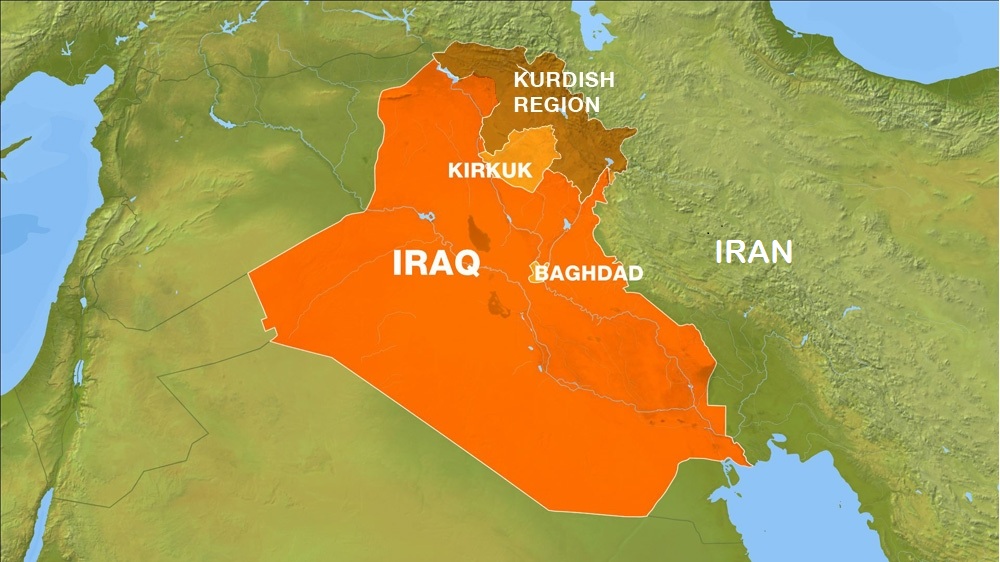Alwaght- The late August vote by the Kirkuk provincial council to participate in the September 25 Kurdish independence referendum has added to the complications of polynomial equation overshadowing the Erbil-Baghdad relations, beside escalating the tensions between the two.
The Iraqi Prime Minister Haider al-Abadi as well as the Turkish foreign ministry's strong reactions to the Kirkuk decision have more than anything laid bare the strategic significance of Kirkuk in the Iraqi political equations. The past Kurdish efforts, especially during the 1960s, to seize control of Kirkuk unleashed serious challenges to the Iraqi political stage, with the escalation reaching levels of military confrontation between the central government and the Kurds.
The city is not important for the two sides only from political and social aspects, rather it matters economically as nearly 40 percent of Iraq oil exports take place from Kirkuk’s oilfields, giving the city a special place in the country’s energy and economic equations. Its certain oil reserves that are said to be about 4 billion barrels raise Kirkuk to rank second after Basra as the city hosting the country’s biggest oilfields.
Ethnic diversity is another drive fueling the different ethnic groups' divisions and disputes. The Kurds label Kirkuk the “Kurdish Jerusalem” and insist that Kirkuk annexation to the Kurdistan Regional Government could help an independent state of Kurdistan to stand on its feet economically.
But the Kurds face the claims of the Turkmens who argue they are the most original and biggest ethnic population of the city but fell victim to the Arabization policy of the former Iraqi dictator Saddam Hussein along with his Baathist party that meant to make the disputed city's population all-Arab through systematic campaign of non-Arab ethnic groups' dislocation.
The Sunni and Shiite Arabs also have their own agenda for the city. The Sunni Arabs argue that their immigration to Kirkuk under Saddam’s rule was a normal process mainly driven by the city’s industrialization motivation. They hold this argument as a shield helping them resist pressures that demand ethnic retreats from the city. The Shiites of Iraq, however, want Kirkuk united with other Iraqi territories and governed by the central government.
The Kirkuk riddle has other aspects. Beside ethnic disputes, the city has so far inflamed regional geopolitical rivalries and concerns, making the equations even harder to solve. Iran, Turkey, and Syria vehemently reject Kirkuk annexation to the Turkish region's territories because they think that this even more sharply emboldens Kurdistan's leaders to seek independence. Moreover, in the viewpoint of these three regional actors, an independent Kurdish state will arouse the separatist desires of the Kurdish minorities in each of these countries.
The Israeli regime in strongest terms backs Kirkuk joining the regional government of Kurdistan as Tel Aviv sees that highly serving the Israeli interests. The US has the hard work of having to balance its alliance with the Kurds and Turkey, which both stand archenemies to each other. It has to make decisions on Kirkuk that both the Kurds and Ankara, an ally of Washington and member of the NATO, find its stance satisfactory and feel no negligence that might distance them from Washington. The US has third party like Iraq also to appease by a balanced stance on Kirkuk to save its toehold in the troubled country.
The EU has also come against the plebiscite of independence. Saudi Arabia, an actor eyeing taking advantage of the Kurds for its own regional agenda, does not find Kurdish split useful strategically as the separation could motivate secessionism in the predominantly Shiite-inhabited eastern parts of the kingdom where major oil reserves are existing. And most importantly, the Iraqi government, seeing Kirkuk as the vital life line for the Iraqi economy, will not allow the Kurds to unilaterally and unconstitutionally make decisions for the resource-rich region out of knowledge that Kirkuk annexation will question sovereignty of the country in a time that Baghdad is in need of power more than any other time to face ISIS terrorists and weather other crises.
The above-mentioned issues make Kirkuk of overarching importance not only at home but also on the regional and international stages. The Kirkuk-related equations are even poised to go more complicated if we become aware of intra-Kurdish discords over the future of the city and even the referendum as a whole. This means that more effective actors will be in the circle to affect Kirkuk future. Kurdish infighting will drag the regional and international players to the internal Kurdish factions' game of power.
In fact, Kirkuk is so weighty geopolitically and geostrategically in Iraq that no side can ignore it. The Iraqi politicians are aware that Kirkuk can provide huge funds through its oil exports that will be put to work to reconstruct the highly-damaged former ISIS-held regions. The city’s riches effects on the realization of the future Iraqi people's interests are unquestionable. Baghdad, furthermore, knows that an independent Kurdish state devoid of the Kirkuk resources will have to deal with hardly-solvable economic difficulties. It is highly possible that Kurdish leaders' failure to respond to the now-strengthened economic and political demands of the people amid the enthusiasm of split campaign will foil the independence project. Some Iraqi politicians, however, declined to raise antipathetic voice to the referendum mainly because of drive of personal interests. But the majority is objecting to the Erbil referendum and Kirkuk seizure efforts.
Kirkuk dispute remains one of the most challenging Iraqi cases still open and increasingly gaining attention. There is no success in sight to the Kurdistan separatist agenda as long as Kirkuk governance continues its uncertainty, though the independence project faces other obstacles. What is certain is the fact that Kirkuk with its rich resources is not something the prospective influential sides can easily withdraw claims for it.



























